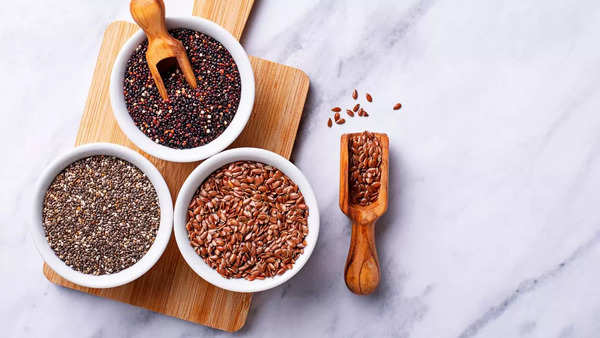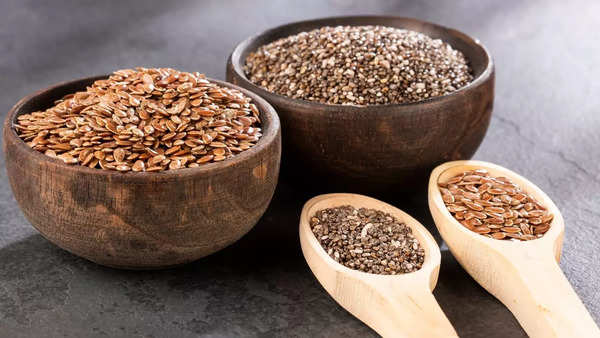Nutritional Comparison:
Chia Seeds:
Nutrient Profile: Chia seeds are small black or white seeds that come from the Salvia Hispanica plant.They are loaded with nutrients like fiber, protein, omega-3 fatty acids (ALA), antioxidants, and various vitamins and minerals such as calcium, phosphorus, and magnesium.
Health Benefits: Chia seeds are renowned for their high fiber content, which promotes digestive health and helps regulate blood sugar levels. They also provide a good source of plant-based protein and omega-3s, which support heart health and reduce inflammation.

Flaxseeds:
Nutrient Profile: Flaxseeds, derived from the Linum usitatissimum plant, are slightly larger than chia seeds and have a nuttier flavor. They are packed with fiber, protein, omega-3 fatty acids (ALA), lignans (plant compounds with antioxidant properties), and vitamins and minerals such as manganese and vitamin B1 (thiamine).
Health Benefits: Like chia seeds, flaxseeds are excellent for heart health due to their omega-3 fatty acid content. They are also a significant source of lignans, which have been studied for their potential cancer-protective effects. The fiber in flaxseeds aids in digestion and helps promote feelings of fullness, making it beneficial for weight management.
Health Considerations:
Both chia seeds and flaxseeds offer substantial health benefits, but there are some differences to consider:
Omega-3 Content: Chia seeds and flaxseeds both contain omega-3 fatty acids, but flaxseeds are particularly rich in ALA (alpha-linolenic acid), whereas chia seeds have a more balanced omega-3 to omega-6 ratio.
Digestive Benefits: Chia seeds are prized for their ability to absorb water and form a gel-like consistency, which can aid digestion and promote a feeling of fullness. Flaxseeds also provide fiber for digestive health but do not form a gel when soaked in the same way chia seeds do.

How to Use Chia Seeds and Flaxseeds Daily:
Incorporating chia seeds and flaxseeds into your daily diet is simple and versatile:
Chia Seeds:
Chia Pudding: Mix chia seeds with your choice of milk or yogurt, sweeten with honey or maple syrup, and let it sit in the fridge overnight for a nutritious breakfast or snack.
Smoothies: Blend chia seeds into your favorite smoothie for added fiber and a nutritional boost.
Salads and Soups: Sprinkle chia seeds on top of salads or soups for added crunch and nutrients.
Flaxseeds:
Ground Flax: Grind flaxseeds in a coffee grinder or blender to release their nutrients more effectively. Add ground flaxseeds to oatmeal, yogurt, or baked goods.
Flaxseed Oil: Use flaxseed oil as a dressing for salads or drizzle over cooked vegetables to boost your omega-3 intake.
Baking: Add ground flaxseeds to muffins, pancakes, or bread dough for a nutty flavor and extra fiber.
Conclusion:
Both chia seeds and flaxseeds offer a range of health benefits and can be easily incorporated into your daily diet. When choosing between them, consider your specific nutritional needs and preferences. Chia seeds are prized for their gel-forming ability and balanced nutrient profile, while flaxseeds are notable for their high ALA content and lignan antioxidants. By adding these nutrient-dense seeds to your meals and snacks regularly, you can enhance your overall health and well-being with minimal effort.